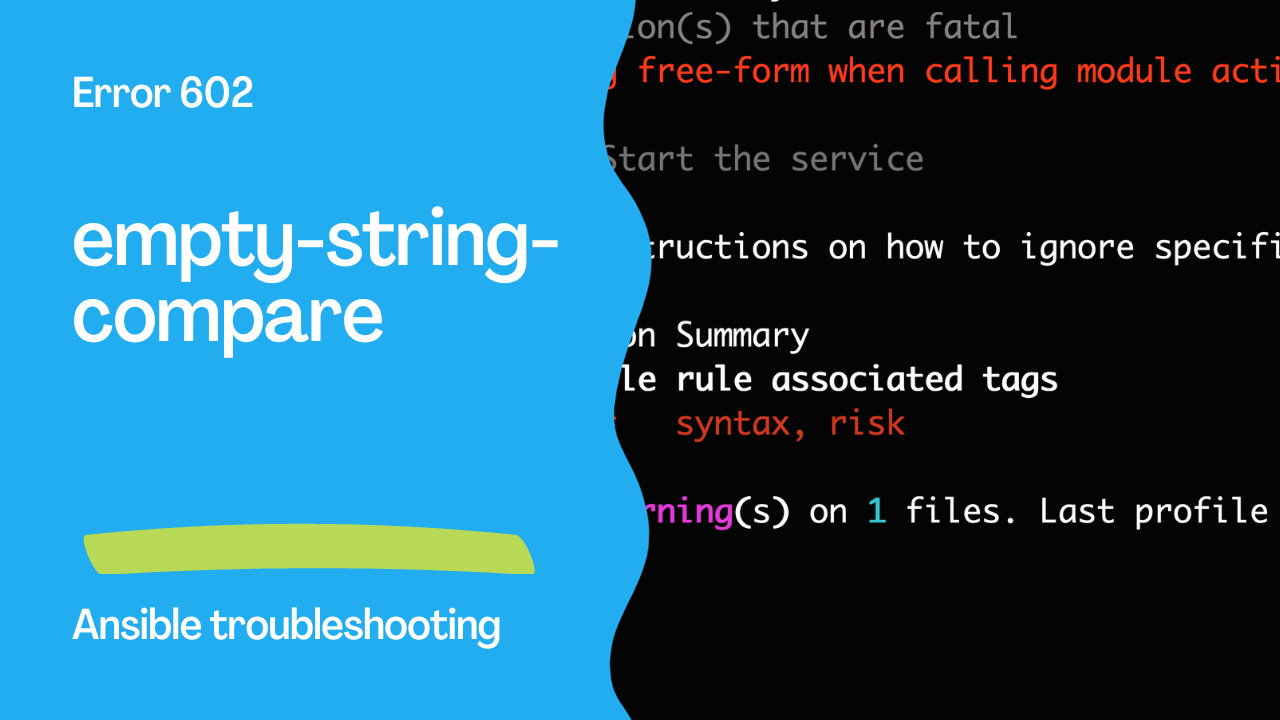Introduction
In the world of automation, clarity and consistency are paramount. Ansible, the popular automation tool, allows you to define tasks and conditions to be executed on various systems. To ensure that your playbooks are easy to read and maintain, adhering to best practices and avoiding code patterns that might lead to confusion is essential. Ansible Rule 602, “empty-string-compare,” specifically targets the comparison of empty strings within playbooks. Let’s dive into why this rule exists and how you can adhere to it effectively.
The Significance of Conditional Statements
Conditional statements are at the heart of any Ansible playbook. They enable you to control when specific tasks are executed based on certain conditions. This provides the flexibility to create playbooks that adapt to various scenarios.
Within these conditional statements, it’s common to compare variables with values, including empty strings. An empty string comparison is typically used to check if a variable has been defined or has a value. However, this approach can introduce code that is less clear and might lead to ambiguity.
Understanding Ansible Rule 602
Ansible Rule 602, “empty-string-compare,” focuses on enforcing code clarity and consistency when it comes to using empty string comparisons within conditional statements. It recommends two specific alternatives for clarity:
Use
when: var | length > 0instead ofwhen: var != "": Instead of checking if a variable is not an empty string, this approach checks if the variable has a length greater than zero. This is more explicit and comprehensible.Use
when: var | length == 0instead ofwhen: var == "": In contrast to comparing a variable to an empty string, this method checks if the variable has a length of zero, indicating that it’s empty.
By adhering to these recommendations, you make your conditional statements more explicit and easier to understand for both you and your team members. Clarity and readability are vital in Ansible playbooks, especially when dealing with complex automation tasks.

Implementing Rule 602
To implement Ansible Rule 602, you need to enable it in your Ansible-lint configuration. Here’s an example of how to add it to your enable list:
enable_list:
- empty-string-compare
Once enabled, Ansible-lint will start checking your playbooks for instances where empty strings are compared. If it finds any, it will provide warnings or suggestions to align with the rule’s recommendations.
Problematic Code and Correct Code
Let’s explore a simple example to understand the difference between problematic code and the correct code, as advised by Rule 602.
Problematic Code
- name: Example playbook
hosts: all
tasks:
- name: Start the service
ansible.builtin.service: name=my-service state=started
when: ansible_distribution == "" # Compares with an empty string.
Output
WARNING Listing 1 violation(s) that are fatal
no-free-form: Avoid using free-form when calling module actions. (ansible.builtin.service)
602.yml:5 Task/Handler: Start the service
Read documentation for instructions on how to ignore specific rule violations.
Rule Violation Summary
count tag profile rule associated tags
1 no-free-form basic syntax, risk
Failed: 1 failure(s), 0 warning(s) on 1 files. Last profile that met the validation criteria was 'min'.
Correct Code
- name: Example playbook
hosts: all
tasks:
- name: Start the service
ansible.builtin.service: name=my-service state=started
when: ansible_distribution | length > 0 # Checks if the variable has a length greater than zero.
By following Rule 602, you can avoid comparisons with empty strings and, instead, use length-based comparisons to enhance the clarity and maintainability of your Ansible playbooks.
The Impact of Adhering to Rule 602
Adhering to Ansible Rule 602 has several advantages:
Improved Clarity: By adopting a more expressive approach in conditional statements, you make your code clearer and easier to understand.
Consistency: Following the rule ensures that your team maintains a consistent style and avoids potentially ambiguous or confusing comparisons.
Maintainability: Clarity and consistency contribute to better playbook maintainability, making it easier to troubleshoot and extend your automation scripts.
Conclusion
In conclusion, Ansible Rule 602, “empty-string-compare,” is a valuable guideline that fosters clarity and consistency in your playbooks. By following its recommendations, you can enhance the readability of your automation code and reduce the potential for misunderstandings or errors. This ultimately contributes to a more efficient and reliable Ansible automation workflow.
Academy
Learn the Ansible automation technology with some real-life examples in my
Udemy 300+ Lessons Video Course.

My book Ansible By Examples: 200+ Automation Examples For Linux and Windows System Administrator and DevOps

Donate
Want to keep this project going? Please donate
